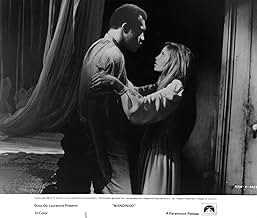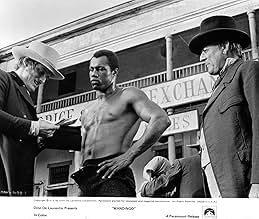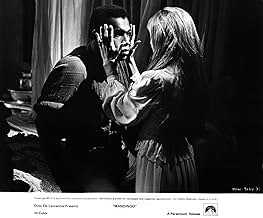VALUTAZIONE IMDb
6,5/10
4488
LA TUA VALUTAZIONE
Nell'America del 1840, uno schiavista addestra uno dei suoi schiavi per farlo diventare un pugile di boxe a mani nude.Nell'America del 1840, uno schiavista addestra uno dei suoi schiavi per farlo diventare un pugile di boxe a mani nude.Nell'America del 1840, uno schiavista addestra uno dei suoi schiavi per farlo diventare un pugile di boxe a mani nude.
- Regia
- Sceneggiatura
- Star
- Premi
- 1 vittoria in totale
Debbi Morgan
- Dite
- (as Debbie Morgan)
Recensioni in evidenza
Mandingo seems to divide it's audience strongly between love and hate and that's not really surprising; the film features some real nasty elements and the way that it's all done with a highly quality 'period drama' sort of style means that it will likely miss it's supposed intended audience - although it seems to have found a good fan base among exploitation fans. The film is liable to shock modern audience for its racial themes and strong racial tone; it didn't bother me all that much to be honest as it suits the film within it's context and helps to enforce its exploitative nature, which in turn makes Mandingo more powerful. The film takes place in the south of America during the 1840's and the main focus of the plot is on slavery. White farm owner Hammond Maxwell one day discovers the fighting talent of one of his black slaves and soon decides to toughen him up for battle with other slaves. He's sympathetic with his slaves and soon becomes affectionate with one of the women, which doesn't sit well with his wife Blanche who, for revenge, forces the top fighter to sleep with her.
Anyone going into this film expecting a serious look at slavery will be either disappointed or annoyed (maybe both), but if you go into it expecting some nasty exploitation, you might find a lot to like. The film gives an unflinching look at a more primitive society and it actually more shocking for its tone and implications than the events that take place in it (although the film does include plenty of racism, torture and rape scenes). The way that the film depicts the black slaves as animals makes for uncomfortable viewing and the way that society was segregated into 'white masters' and 'black slaves' is always enforced on the viewer. The performances sit better with the exploitation side of the film rather than the serious drama side as none of them are particularly brilliant; although the three leads do fit into their roles well. Overall, this is clearly not a film for everyone and I'm not in any way saying that the film's bad reputation is in any way undeserved; but Mandingo is certainly an interesting film and I would say it is at least worth seeing.
Anyone going into this film expecting a serious look at slavery will be either disappointed or annoyed (maybe both), but if you go into it expecting some nasty exploitation, you might find a lot to like. The film gives an unflinching look at a more primitive society and it actually more shocking for its tone and implications than the events that take place in it (although the film does include plenty of racism, torture and rape scenes). The way that the film depicts the black slaves as animals makes for uncomfortable viewing and the way that society was segregated into 'white masters' and 'black slaves' is always enforced on the viewer. The performances sit better with the exploitation side of the film rather than the serious drama side as none of them are particularly brilliant; although the three leads do fit into their roles well. Overall, this is clearly not a film for everyone and I'm not in any way saying that the film's bad reputation is in any way undeserved; but Mandingo is certainly an interesting film and I would say it is at least worth seeing.
In slave-owning Louisiana, Hammond Maxwell (Perry King) is a dutiful son managing his family's rundown plantation and its slaves. He is considered kind compared to other slave owners but he is still fully involved in the institution. He has sex with his slave Ellen and takes a liking to her. He marries his cousin Blanche but their marriage is troubled from the start. From his father, he gets obsessed with purchasing a Mandingo, a slave gladiator. He buys hulking submissive Mede (Ken Norton) who he hopes to turn into a fighter.
It's fascinating how times have change. This is comparable to 12 Years a Slave. While 12 got Best Picture, this got panned. The violence and brutality is matter of fact. There is nothing special in the whipping and the raping. They are everyday occurrences. Even Hammond is not out of the ordinary. He still has some of his humanity which only makes this even darker and more real. Back in '75, this brutal depiction of slavery was probably too much for many and was ahead of its time. It doesn't turn it into melodrama. It lets the audience exist in the dark times. Tarantino sees this as influencing his Django Unchained. It is missing more from the slaves' side of their existence. It would probably be better to have both Hammond and Ellen as protagonists. It needs to get inside the slaves' mind. Despite that, this is still a shocking and compelling movie.
It's fascinating how times have change. This is comparable to 12 Years a Slave. While 12 got Best Picture, this got panned. The violence and brutality is matter of fact. There is nothing special in the whipping and the raping. They are everyday occurrences. Even Hammond is not out of the ordinary. He still has some of his humanity which only makes this even darker and more real. Back in '75, this brutal depiction of slavery was probably too much for many and was ahead of its time. It doesn't turn it into melodrama. It lets the audience exist in the dark times. Tarantino sees this as influencing his Django Unchained. It is missing more from the slaves' side of their existence. It would probably be better to have both Hammond and Ellen as protagonists. It needs to get inside the slaves' mind. Despite that, this is still a shocking and compelling movie.
This movie is a disturbing look at the realities of the antebellum South. And yes, I do believe the depictions and events in this movie are realistic. Such atrocities are well-documented. Both the movie and the book contain graphic violence, sex, and rape. The movie is sometimes difficult to watch, but it's worth watching, for anyone who ponders the evils of humanity and especially the history of the U.S. during the 1800's. The acting and film quality aren't upper echelon. The dialogue is sometimes excessively histrionic. But that's not what's so good about this movie. It's gritty, realistic, and brutally honest.
As I watched, I realized that maybe things haven't changed so much since those times. Racism and sexism are still very much alive. You can easily compare the attitudes and behaviors depicted in this film with things that go on in our society today. Some people have commented that Blanche was "oversexed". I find that a rather hilarious statement. They obviously don't get the feminist subplot of this movie. The way it depicts and breaks down racism and sexism and shows exactly why they're faulted ideologies is why I love this movie so much!
As I watched, I realized that maybe things haven't changed so much since those times. Racism and sexism are still very much alive. You can easily compare the attitudes and behaviors depicted in this film with things that go on in our society today. Some people have commented that Blanche was "oversexed". I find that a rather hilarious statement. They obviously don't get the feminist subplot of this movie. The way it depicts and breaks down racism and sexism and shows exactly why they're faulted ideologies is why I love this movie so much!
I just watched Mandingo and can't for the life of me figure out why this film would get any critical reviews. You can't criticize the truth unless you yourself are part of the lie or involved in hiding the truth or you just want to ignore the truth and live in a fantasy world. Like those freaks that refuse to acknowledge the holocaust really happened or say it wasn't that horrible. This film hits you with the truth about 1840ish slavery with a vengeance, shocking, sickening, and uncomfortable as it should be. It doesn't sugar coat the South and especially the Deep South with shades of romantic Gone with the Wind feel sorry for us we lost our culture nonsense, but shows in detail all the dehumanizing, sickening, savage racist attitudes that existed in the south at that time. The buying and selling of human beings should be as sickening and repulsive as it gets and left to me this film would be mandatory viewing by all high school students in this country to help them understand the barbarism of slavery and how it's residue still affects and infects this country to this day. If you get a chance to rent or view this film a note of advice, be prepared for the truth!
This unflinching, hard-hitting look at slavery is a severely underrated and misjudged film. That's probably because it sheds light onto a tough, painful subject that many people would prefer to ignore or forget; if you're expecting a "slaves-and-masters-are-all-a-big-happy-family" depiction of the life in the mid-19th-century Southern plantations, then this simply isn't your movie.
"Mandingo" was followed, one year later, by "Drum". They are both far better films than their reputations might make you believe, and they are also handsome, almost sumptuous productions with a far lower "sleaze" quotient than many reviews seem to indicate. They are both worth seeing - preferably as a double bill. (***)
"Mandingo" was followed, one year later, by "Drum". They are both far better films than their reputations might make you believe, and they are also handsome, almost sumptuous productions with a far lower "sleaze" quotient than many reviews seem to indicate. They are both worth seeing - preferably as a double bill. (***)
Lo sapevi?
- QuizJames Mason admitted in interviews that he only made the film to make his alimony payments.
- BlooperDuring Mede's first fight in the city, he and his opponent are wrestling on the grass. When they roll over on the floor, the grass moves like a slipping carpet would, revealing it to be a sheet of artificial green, probably lying on the floor of a sound stage.
- Versioni alternativeThe international version of the film (released on PAL region 2 DVD) contains a different cut of the film that runs approx. 5 minutes shorter than the U.S. release but also has many scenes presented in alternate clothed takes. In all 12 scenes were either trimmed or re-edited with alternate shots/angles/takes:
- Scene where slave is bent over and inspected for hemorrhoids is cut.
- Scene where the wench is being prepared for her deflowering is presented in an alternate take where her breasts are not exposed.
- Scene with pregnant wench is shot with alternate angles to obscure nudity. Perry King's full frontal nudity is cut and replaced with a closer shot that reveals he is wearing shorts when he kneels down to pray (It looks like a goof - only a bit of the waistband can be seen at the corner of the frame).
- Alternate takes of the slave being strung up to be beaten are used to obscure nudity, and many shots of him being beat and left bloody are cut.
- A few seconds where Perry King's cousin rips off a wench's dress and bends her over to begin beating her is cut to remove nudity. The beating is left intact.
- The slave market scene is edited to remove the topless wenches on display, and the shot where the German widow sticks her hand into Ken Norton's shorts and "inspects" him is cut short. The second shot with her hand in and then removing it is left intact though.
- An alternate take is used with a prostitute clothed rather than nude at the bawdy house.
- A few seconds of a prostitute rubbing on Perry King's crotch is cut.
- An alternate take is used during the fight at the bawdy house so that a prostitute is seen holding her dress up while she cheers whereas in the original she lets it fall and her breasts be exposed.
- The entire scene between Perry King and Brenda Sykes in which she asks him if he'll let their child go free is presented in alternate clothed takes. In the original film they are both completely nude. Even the camera angles and setups are the same, only with clothes in the international version.
- In the scene where Ken Norton fights a man to death one long shot where the other fighter claws his back is cut. Also cut is when Ken bites down on the other fighter's neck, is pulled off, and then bites into his neck again. All the close-ups are cut.
- The Susan George/Ken Norton love scene is almost entirely missing. Ken Norton's nudity is cut, and then the scene ends in an alternate take when the two go out of frame onto the bed. The original scene went on for much longer and exposed Ken Norton's buttocks and Susan George's breasts. The German theatrical version does not feature any of these alterations and is identical to the U.S. release.
- ConnessioniFeatured in Una tenera primavera (1979)
- Colonne sonoreBorn in This Time
Music by Maurice Jarre
Lyrics by Hitide Harris (as Hi Tide Harris)
Sung by Muddy Waters
[Played during opening title and credits]
I più visti
Accedi per valutare e creare un elenco di titoli salvati per ottenere consigli personalizzati
Dettagli
- Data di uscita
- Paese di origine
- Lingue
- Celebre anche come
- Bitmeyen Kavga
- Luoghi delle riprese
- Aziende produttrici
- Vedi altri crediti dell’azienda su IMDbPro
Botteghino
- Lordo Stati Uniti e Canada
- 2.433.010 USD
- Tempo di esecuzione2 ore 7 minuti
- Mix di suoni
- Proporzioni
- 1.85 : 1
Contribuisci a questa pagina
Suggerisci una modifica o aggiungi i contenuti mancanti




































